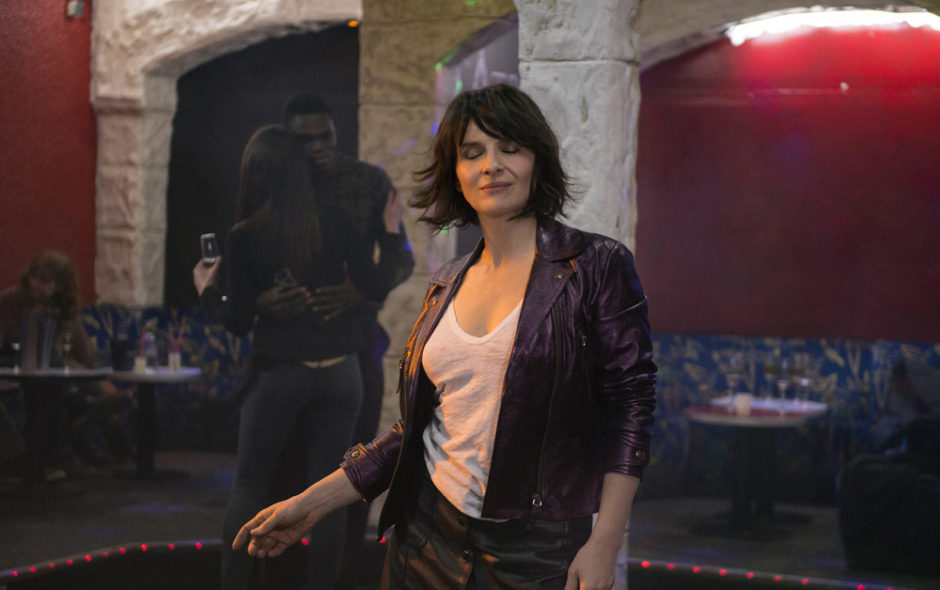Don’t let the title Let The Sunshine In fool you. The English name of French filmmaker Claire Denis’ latest — Un Beau Soleil Intérieur in her native France — sounds more appropriate as a banal inspirational quote on an ombre-pink-hued vision board than a film by Denis. Some have called it the first rom-com for the 73-year-old auteur — an accurate term if a rom-com consisted primarily of gallows humour.
Denis’ paradoxically cynical, humanist cinema has tackled topics as serious and cerebral as post-colonialism, sexual violence and the gendered performance of masculinity across a richly layered body of work. Rarely does it hinge on the romantic, like in Sunshine. But “romantic” implies idealism, and Sunshine is bittersweet in its depiction of love, steely while sexy, presenting the navigation of middle-age dating and soulmate-searching as a confusing and contradictory journey.
Isabelle’s (Juliette Binoche) tribulations might have something to do with the quality of men she dates. Most are awful in a variety of fashions: Victor (Xavier Beauvois), a contemptuous middle-aged banker whose treatment of servers is an immediate red flag; a younger, unnamed alcoholic actor (Nicolas Duvauchelle) with a hot-and-cold temperament, who blames Isabelle for feeling too vulnerable around her; her ex-husband François (Laurent Grévill), who tries to control Isabelle’s personal space in the guise of protecting their daughter. The former two have wives, so it’s not like Isabelle is doing herself any favours choosing the men she attempts to love.
But this is what Sunshine is all about: the complications of our desires, of making mistakes. What distinguishes Denis’ script (co-written by novelist Christine Angot and loosely based on Roland Barthes’s A Lover’s Discourse: Fragments) and her filmmaking is the gutting complexity of such a simple idea and premise. Denis keeps her camera and visual compositions simple, though pointed. There are lingering close-ups of Binoche’s sad, searching face as she tries to understand her lovers, her eye makeup is as smouldering as the sensuality she yearns to find.
The film opens with a languid, loveless sex scene between Victor and Isabelle. Later, she confides to a friend that she liked having sex with Victor because “he’s a bastard.” He proves this point most astutely when the couple is at a bar. Isabelle tries to keep up with Victor’s negging games while humouring his ostentatious request from the barkeep for “gluten-free olives.” Here, the camera playfully bounces back and forth between the two actors like a ceiling lamp knocked askew, hinting at the competitive dynamic of dating someone as dominant as Victor. In another scene between the sheets, he tells Isabelle that she’s interesting, but his wife is … extraordinary.
The oscillation between Isabelle’s lustful hatred inspired by such remarks and her romantic optimism is delightful to watch in Denis’ narrative composition, as well as her tongue-in-cheek pop-culture references – namely, the use of Etta James’s insipid, saccharine love song “At Last,” which comes on just as Isabelle serendipitously meets a stranger, Sylvain (Paul Blain), on the dance floor.
Unlike other romantic comedies dealing with middle-aged dating, like the recent, pandering, messy Book Club, or Sebastian Lelio’s excellent Gloria — about a Chilean woman entering the dating scene after a long lapse — Sunshine doesn’t just embrace the sexuality of middle-aged women, it portrays it as a given. It’s easier to accept an older woman having sex onscreen when the actress is as beautiful as Juliette Binoche, of course, but it’s also likely that a filmmaker like Denis — from a culture more sexually liberated than other Western countries, including our own — would never consider such representation as even questionable. That resulting candour about sex is refreshing, to say the least.

